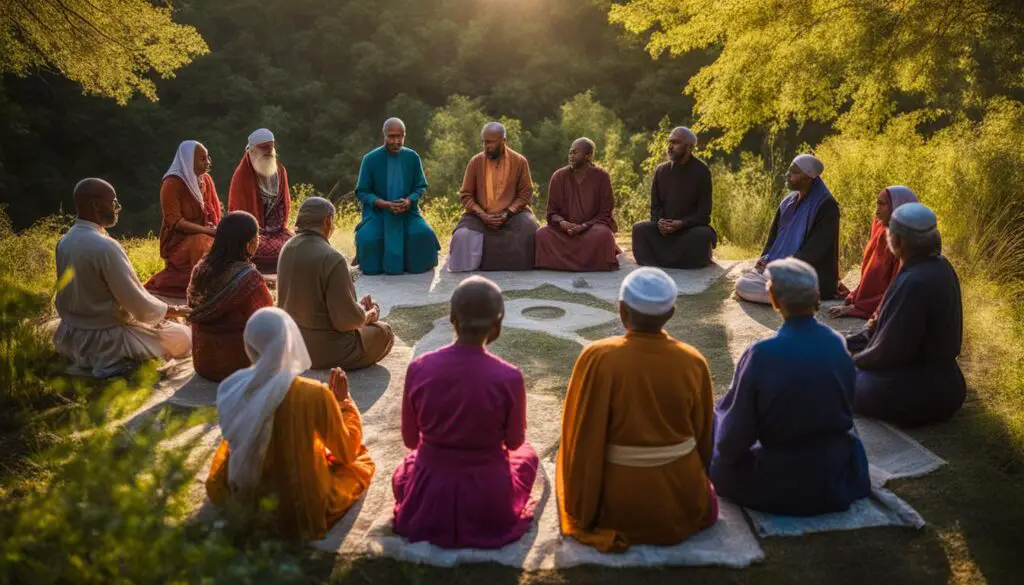Interfaith prayer is a powerful practice that brings together people of different faiths to experience unity, harmony, and the divine presence. It is a way to celebrate the common values and teachings of various religions and foster a sense of understanding and respect. Through interfaith prayer gatherings, services, and events, individuals can come together to pray, meditate, reflect, and share spiritual moments side by side.
Key Takeaways:
- Interfaith prayer promotes unity, peace, understanding, and tolerance.
- Interfaith prayer can take various forms, including gatherings, services, and events.
- Organizing and participating in interfaith prayer activities require creating a space for all faiths to gather.
- Examples of interfaith prayer initiatives demonstrate its power in fostering understanding and harmony.
- Interfaith prayer has the potential to create positive social change and build inclusive societies.
The Power of Interfaith Prayer and its Benefits
Interfaith prayer has numerous benefits that contribute to greater unity, peace, understanding, and tolerance among diverse communities. By coming together to pray and share spiritual moments, individuals can deepen their own spiritual practice while learning about different religious traditions. Through this practice, interfaith prayer promotes a sense of harmony and common purpose.
One of the primary benefits of interfaith prayer is its ability to cultivate unity. When people of different faiths gather to pray side by side, they transcend religious boundaries and focus on their shared values and teachings. This sense of unity extends beyond the prayer itself and can lead to stronger relationships, increased cooperation, and a sense of belonging within a larger community.
Interfaith prayer also fosters peace by providing a space for individuals to come together in a spirit of understanding and respect. By praying alongside people from different religious backgrounds, individuals gain insights into other belief systems, promoting a sense of empathy and reducing prejudice. This can contribute to greater harmony and peaceful coexistence among diverse communities.
Furthermore, interfaith prayer enhances understanding and tolerance. By engaging in dialogue and learning about different religious traditions, individuals develop a deeper appreciation for the diversity of human spirituality. This understanding fosters a sense of respect, acceptance, and empathy, leading to more inclusive and compassionate societies. Through interfaith prayer, people can work towards breaking down barriers and building bridges between religions.

Different Forms of Interfaith Prayer
Interfaith prayer can take various forms, providing opportunities for individuals of different faiths to come together, express their spirituality, and foster a sense of unity and understanding. These different forms of interfaith prayer gatherings, services, and events offer unique experiences and insights into the shared values and teachings of various religious traditions.
Interfaith Prayer Gatherings
In interfaith prayer gatherings, individuals from different faiths gather in a shared space to pray, meditate, and partake in spiritual experiences. These gatherings often include prayers from different religious traditions, readings, and reflections. They provide a platform for believers to express their devotion and connect on a deeper level, fostering a sense of community and mutual respect.
Interfaith Prayer Services
Interfaith prayer services are organized for believers from different denominations within the same religion to come together in prayer. These services typically take place at a common location and are conducted in a language that is understood by all participants. By praying together, individuals from different denominations affirm their shared faith and strengthen their bond as a unified religious community.
Interfaith Prayer Events
Interfaith prayer events are organized to explore the scriptures and teachings of various religions, emphasizing their similarities and promoting a deeper understanding among participants. These events often feature religious leaders who share their perspectives, engage in dialogue, and facilitate discussions on common themes. Through these events, attendees gain insight into different religious traditions and develop a greater appreciation for diversity.
Interfaith prayer in its various forms provides a powerful and transformative experience, promoting unity, peace, and understanding among individuals of different faiths. By coming together in prayer, believers celebrate their shared humanity and contribute to a more harmonious and inclusive society.
Organizing and Participating in Interfaith Prayer Activities
Organizing and participating in interfaith prayer activities require creating a space where people of all faiths can gather. This can be done through online platforms, hashtags, or physical locations such as community centers or places of worship. Interfaith prayer activities can be initiated by individuals, religious organizations, or interfaith organizations. It is important to invite individuals from diverse religious backgrounds, foster an atmosphere of respect and inclusivity, and provide opportunities for sharing prayers, songs, reflections, and silence.
The Role of Online Platforms
With the advancement of technology, online platforms have become an effective way to organize and participate in interfaith prayer activities. Social media platforms can be utilized to create virtual communities where individuals from different faiths can come together to share prayers, inspirational quotes, and engage in meaningful discussions. Hashtags can be used to connect individuals with similar interests and create a sense of unity across various online platforms.
Physical Locations for Interfaith Prayer
Physical locations such as community centers or places of worship can serve as gathering spaces for interfaith prayer activities. These spaces provide a neutral ground where individuals from different religious backgrounds can come together and engage in prayer, meditation, and reflection. It is crucial to ensure that these spaces are welcoming, accessible, and inclusive, allowing everyone to feel comfortable and respected.
“Interfaith prayer is a transformative practice that brings people of different faiths together to experience unity, harmony, and spiritual connection.”
Fostering Inclusivity and Respect
In order to create a meaningful interfaith prayer experience, it is essential to foster an atmosphere of inclusivity and respect. This includes actively inviting individuals from diverse religious backgrounds, being mindful of cultural sensitivities, and providing opportunities for everyone to contribute and participate. It is important to recognize and appreciate the distinctiveness of each faith tradition while celebrating the common values and teachings that unite us all.

Table: Examples of Interfaith Prayer Activities
| Activity | Description |
|---|---|
| Interfaith Prayer Gathering | A gathering where individuals from different faiths come together to pray, meditate, and share spiritual experiences. |
| Interfaith Prayer Service | A service where believers from different denominations of the same religion unite in prayer at a common location and in the same language. |
| Interfaith Prayer Event | An event organized to reflect on scriptures from different religions, highlighting the similarities and fostering a deeper understanding among participants. |
Interfaith prayer activities can take various forms depending on the goals and preferences of the organizers and participants. Whether it’s a small gathering, a regular service, or a large-scale event, the key is to create a space where individuals of all faiths can come together, connect, and experience the power of unity through prayer.
Examples of Interfaith Prayer Initiatives
Interfaith prayer initiatives are a powerful way to bring people of different faiths together, fostering understanding, unity, and peace. Here are a few examples of notable interfaith prayer gatherings, services, and events around the world:
The Adyan Prayer Network
The Adyan Foundation, based in Beirut, Lebanon, organizes the Adyan Prayer Network, which invites people from different faiths to participate in interfaith prayer gatherings. The network focuses on various concepts or issues and aims to promote dialogue, harmony, and spiritual connection. Through these gatherings, individuals from diverse religious backgrounds come together to pray side by side, embracing their shared humanity and celebrating their differences.
Interfaith Funeral Prayer Service at the Great Synagogue of Poland
In a poignant display of solidarity, the Great Synagogue of Poland organized an interfaith funeral prayer service to honor the former Pope John Paul II. Christians and Jews gathered together, setting aside their religious differences, to pray for the late Pope. This event showcased the power of interfaith prayer in fostering understanding, compassion, and shared values among different religious communities.
These examples highlight the transformative potential of interfaith prayer in creating connections, promoting peace, and fostering a sense of unity among diverse communities. They demonstrate that through interfaith prayer gatherings, services, and events, people can come together, overcome barriers, and celebrate their shared humanity.
| Interfaith Prayer Initiative | Location | Description |
|---|---|---|
| The Adyan Prayer Network | Beirut, Lebanon | An interfaith prayer network that focuses on various concepts or issues, inviting people from different faiths to participate and fostering dialogue and harmony. |
| Interfaith Funeral Prayer Service | Great Synagogue of Poland | An interfaith funeral prayer service organized to honor the former Pope John Paul II, where Christians and Jews came together to pray in solidarity. |
These initiatives serve as inspiring examples of the positive impact that interfaith prayer can have on individuals and communities. By coming together to pray, people of different faiths can transcend religious boundaries, deepen their understanding of one another, and work towards building a more harmonious and inclusive society.
Impact and Focus of Interfaith Prayer
Interfaith prayer has the power to create a profound impact on individuals and communities, fostering unity, peace, understanding, and tolerance. By bringing people of different faiths together with a shared purpose, interfaith prayer cultivates relationships and strengthens bonds, promoting a sense of harmony and commonality. It highlights the common values and teachings of different religions, emphasizing their shared commitment to love, compassion, and social justice.
Through interfaith prayer, individuals and communities can experience a deep sense of connection to something greater than themselves, transcending religious boundaries and fostering a spirit of inclusivity. It provides a platform for dialogue, collaboration, and mutual respect, allowing people to learn from one another’s beliefs and practices. By focusing on shared goals and aspirations, interfaith prayer creates a space for individuals to come together and collectively address pressing social issues.
The focus of interfaith prayer is not only on individual spiritual growth but also on building a more harmonious society. It serves as a reminder that despite our differences, we share a common humanity and a desire for peace and understanding. Interfaith prayer encourages individuals to reflect on their own faith traditions while appreciating the beauty and wisdom of others. It challenges stereotypes and fosters empathy, promoting a climate of acceptance and dialogue.
Interfaith Prayer for Unity, Peace, Understanding, and Tolerance
Interfaith prayer emphasizes the importance of unity, peace, understanding, and tolerance among diverse religious communities. It encourages individuals to look beyond religious differences and recognize the shared humanity that binds us together. Through interfaith prayer, people can find common ground and work towards a world where all religions are respected and valued.

| Focus | Benefits |
|---|---|
| Unity | Promotes understanding and cooperation among diverse religious communities |
| Peace | Fosters a climate of harmony and works towards resolving conflict |
| Understanding | Provides a platform for learning about different faith traditions and promoting dialogue |
| Tolerance | Cultivates acceptance and respect for religious diversity |
Challenges and Opportunities of Interfaith Prayer
While interfaith prayer offers numerous opportunities for connection, understanding, and unity among diverse religious communities, it also presents its fair share of challenges. The inherent differences in religious beliefs, practices, and rituals can potentially create conflicts or misunderstandings during interfaith prayer activities. It is crucial to approach these challenges with openness, respect, and a willingness to learn from one another to foster a truly inclusive and harmonious environment.
One of the main challenges of interfaith prayer is navigating the diverse theological perspectives and interpretations that exist among different religious traditions. Each faith has its own unique set of beliefs, values, and customs, which can sometimes clash with or seem incompatible to others. However, this challenge can also serve as an opportunity for individuals to deepen their understanding of different religions and foster a sense of empathy and acceptance.
Another challenge is the potential resistance or skepticism from within religious communities towards engaging in interfaith prayer. Some individuals may fear that participating in interfaith activities could compromise their own beliefs or dilute the distinctiveness of their faith. However, embracing interfaith prayer as an opportunity for dialogue, mutual respect, and spiritual growth can help overcome these challenges and nourish a culture of harmonious coexistence.
The Opportunities of Interfaith Prayer
Despite the challenges, interfaith prayer also presents unique opportunities for personal and collective transformation. By coming together in prayer, individuals from different faiths can experience a shared sense of transcendence and connect with the divine presence beyond the boundaries of their own religious traditions. This shared experience of spirituality can deepen their own spiritual practice and foster a deeper appreciation for the diversity of religious expressions.
Interfaith prayer provides a platform for dialogue and the exchange of ideas, allowing individuals to learn from one another’s religious texts, rituals, and spiritual practices. Through this exchange, participants can gain a broader understanding of the universal values that underpin various religious traditions, such as love, compassion, justice, and peace. It is through this understanding that interfaith prayer has the potential to foster greater cooperation, social cohesion, and collective action towards addressing global challenges.
The opportunities offered by interfaith prayer extend beyond individual growth and community cohesion. They also hold the promise of contributing to a more peaceful and harmonious world by promoting dialogue, understanding, and respect among diverse religious communities. By embracing the challenges and seizing the opportunities presented by interfaith prayer, individuals and communities can cultivate a society that values diversity, inclusion, and the shared quest for spiritual enlightenment.
The Role of Interfaith Organizations and Institutions
Interfaith organizations and institutions play a crucial role in promoting and facilitating interfaith prayer activities. They provide platforms for dialogue, collaboration, and education to foster understanding and respect among diverse religious communities. These organizations often organize interfaith prayer gatherings, services, and events, creating spaces for individuals to come together and connect on a spiritual level. Through their efforts, interfaith organizations and institutions contribute to building bridges between religions and cultivating a sense of unity and harmony in society.
Interfaith organizations serve as catalysts for interreligious dialogue and cooperation. They bring together representatives from different faith traditions to engage in meaningful conversations, share experiences, and learn from one another. By creating opportunities for dialogue, interfaith organizations promote mutual understanding and help break down barriers that can arise from misconceptions or lack of knowledge about other religions. Through these dialogues, individuals gain a deeper appreciation for the diversity of religious beliefs and practices, fostering a more inclusive and tolerant society.
“Interfaith organizations play a vital role in bridging the gap between different religious communities and promoting a culture of peace and harmony. By facilitating interfaith prayer activities, these organizations provide a safe space where people of different faiths can come together, pray, and share their spiritual experiences. Through such initiatives, they promote a greater understanding of different religious traditions and encourage individuals to embrace their shared values and beliefs.”
Interfaith institutions, such as educational institutions or research centers, also contribute to the advancement of interfaith prayer. They offer resources, training, and academic programs that promote interreligious dialogue and understanding. These institutions conduct research and publish studies to deepen the knowledge and understanding of interfaith practices. By fostering an environment of learning and scholarship, interfaith institutions play a vital role in nurturing the next generation of leaders committed to fostering interfaith cooperation and understanding.
Interfaith Organizations and Institutions: Promoting Unity and Understanding
The work of interfaith organizations and institutions is essential in promoting unity and understanding among diverse religious communities. They provide the necessary infrastructure and support for interfaith prayer activities, helping to break down barriers and foster connections between people of different faiths. Through their efforts, interfaith organizations and institutions contribute to creating a more inclusive and compassionate world where individuals from all religious backgrounds can come together in prayer and solidarity.
The Future of Interfaith Prayer
Interfaith prayer has become increasingly important in today’s diverse and interconnected world. As we look to the future, the practice of interfaith prayer holds great potential for fostering understanding, promoting peace, and addressing pressing global issues. By embracing religious diversity and celebrating shared values, interfaith prayer can contribute to the creation of inclusive and compassionate societies.
One of the key benefits of interfaith prayer is its ability to bring people from different faith traditions together, bridging divides and promoting dialogue. As this practice continues to gain recognition and popularity, we can expect to see more interfaith prayer gatherings, services, and events taking place worldwide. These initiatives provide opportunities for individuals to learn about and appreciate different religions, thereby breaking down stereotypes and fostering a sense of unity.
The Role of Education and Awareness
In order to fully realize the potential of interfaith prayer, education and awareness play crucial roles. Schools, religious institutions, and interfaith organizations can play a significant role in promoting interfaith education and dialogue. By incorporating interfaith studies into curricula and offering opportunities for interfaith engagement, we can ensure that future generations are equipped with the knowledge and understanding necessary to navigate a diverse and interconnected world.
Addressing Global Challenges
Interfaith prayer also has the power to address the pressing global challenges of our time. As communities come together in prayer, they can collectively reflect on and seek guidance from their respective religious teachings to address issues such as poverty, climate change, and social injustice. The future of interfaith prayer lies in its ability to inspire action and encourage individuals of different faiths to work together towards common goals.
| Benefits of Interfaith Prayer | Challenges of Interfaith Prayer | Opportunities of Interfaith Prayer |
|---|---|---|
| 1. Promotes unity among people of different faiths. | 1. Potential conflicts or misunderstandings due to different religious beliefs. | 1. Provides a platform for dialogue and understanding among diverse communities. |
| 2. Cultivates a sense of peace, understanding, and tolerance. | 2. Lack of awareness and knowledge about different religious traditions. | 2. Creates opportunities for cooperation and collaboration. |
| 3. Deepens individual spiritual practice. | 3. Overcoming biases and preconceived notions about other religions. | 3. Fosters relationships and builds bridges between religions. |
The future of interfaith prayer looks bright as more individuals and communities recognize the importance of embracing religious diversity. By coming together in prayer, people of different faiths can forge deeper connections, promote understanding, and work towards a more harmonious and inclusive future.
Conclusion
Interfaith prayer is a transformative practice that brings people of different faiths together to experience unity, harmony, and spiritual connection. Through interfaith prayer gatherings, services, and events, individuals can come together to celebrate common values and teachings, fostering a sense of understanding and respect.
Interfaith prayer offers numerous benefits, including promoting peace, understanding, and tolerance among diverse communities. It provides a platform for individuals to learn about different religious traditions and deepen their own spiritual practice. By embracing the diversity of religious traditions and celebrating their shared values, interfaith prayer can foster a sense of unity and contribute to a more harmonious society.
With the support of interfaith organizations and institutions, interfaith prayer has the potential to create a more inclusive and compassionate world. These organizations work towards building bridges between religions, organizing interfaith prayer gatherings, services, and events that create spaces for individuals to come together and connect on a spiritual level. By embracing the diversity of religious traditions and celebrating their shared values, interfaith prayer can foster a sense of unity and contribute to a more harmonious society.
As more individuals and communities recognize the importance of embracing religious diversity and fostering peaceful coexistence, the future of interfaith prayer looks promising. Interfaith prayer has the potential to create positive social change, promote interreligious harmony, and address pressing global issues. By celebrating the shared values and teachings of different religions, interfaith prayer can be a powerful tool for building inclusive and compassionate societies.
FAQ
What is interfaith prayer?
Interfaith prayer is a practice that brings together people of different faiths to experience unity, harmony, and the divine presence. It celebrates the common values and teachings of various religions and fosters understanding and respect.
What are the benefits of interfaith prayer?
Interfaith prayer promotes unity, peace, understanding, and tolerance among diverse communities. It helps individuals learn about different religious traditions, deepen their own spiritual practice, and fosters dialogue, connection, and cooperation.
In what forms can interfaith prayer take place?
Interfaith prayer can be organized as gatherings, services, or events where individuals from different faiths come together to pray, meditate, and share spiritual experiences.
How can I organize or participate in interfaith prayer activities?
Interfaith prayer activities can be initiated by individuals, religious organizations, or interfaith organizations. They can be organized online or in physical locations such as community centers or places of worship.
Can you give examples of interfaith prayer initiatives?
Adyan, an organization based in Beirut, Lebanon, organizes a prayer network that invites people from different faiths to participate. The Great Synagogue of Poland organized an interfaith funeral prayer service to honor the former Pope John Paul II, where Christians and Jews came together to pray in solidarity.
What is the impact and focus of interfaith prayer?
Interfaith prayer promotes unity, peace, understanding, and tolerance among diverse communities. It focuses on the common values and teachings of different religions, highlighting their shared commitment to love, compassion, and social justice.
What are the challenges and opportunities of interfaith prayer?
Different religious beliefs, practices, and rituals can create potential conflicts or misunderstandings in interfaith prayer. However, by approaching it with openness, respect, and a willingness to learn from one another, interfaith prayer can be a transformative and enriching experience.
What is the role of interfaith organizations and institutions?
Interfaith organizations and institutions play a vital role in promoting and facilitating interfaith prayer activities. They provide platforms for dialogue, collaboration, and education to foster understanding and respect among diverse religious communities.
What does the future of interfaith prayer look like?
As more individuals and communities recognize the importance of religious diversity and peaceful coexistence, the future of interfaith prayer looks promising. It has the potential to create positive social change, promote interreligious harmony, and address global issues.








